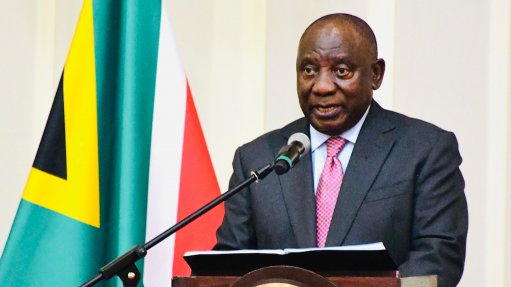
President Cyril Ramaphosa
President Cyril Ramaphosa noted on Monday that with improved funding for the country’s Just Energy Transition, government will be able to invest substantially in strengthening the country’s electricity grid and new renewable energy generation.
In his weekly letter to the nation, Ramaphosa said that this will make a significant contribution towards ending loadshedding and securing a reliable and affordable supply of electricity.
“This will, in turn, promote economic growth, make our exports more competitive and create employment,” he added.
South Africa’s Just Energy Transition Investment Plan, which was released last year, estimates that the country will need around $98-billion over the next five years to transition towards a low-carbon economy.
Last week, several world leaders gathered in Paris, France for a global summit on financing development and climate action in developing economies, where there was a broad consensus among most of the countries that much more funding is needed and that international development banks need to be significantly reformed to direct that funding to where it will have the greatest impact.
Ramaphosa, who was in attendance, said that there was general agreement that additional private sector funding should be mobilised and that funding should be provided on better terms.
“This funding will also enable us to develop new industries, such as electric vehicles and green hydrogen, which will increase our industrial output and create jobs for the economy of the future. Through such funding, we can increase our investment in infrastructure, expanding the capacity of our economy and reducing the costs for emerging businesses,” he added.
He explained that the country is working to accelerate the implementation of its Energy Action Plan and Economic Reconstruction and Recovery Plan so that it can end loadshedding, grow the economy and create jobs.
“We need to continue to assert the needs and interests of developing economies in these international forums, so that we can raise the funds that are required to achieve a just transition and advance our developmental objectives. This is important not only for people in South Africa, but for people throughout the Global South,” he said.
Ramaphosa noted that global development financing, if properly directed and provided on a significant scale, can make a huge difference to the lives of people living in countries like South Africa.
“As we said at the summit, we do not want to be treated like beggars, as if we are asking for charity. The industrialisation and economic development of the Global North was achieved at the expense of the Global South. Wealthier countries, therefore, have both an obligation and an interest in supporting development and climate action in poorer countries,” Ramaphosa added.
He highlighted that while much has been achieved in South Africa to address the needs of the poor since the advent of democracy, this work has been undermined by slow economic growth, State capture and corruption, the electricity crisis and the Covid-19 pandemic.